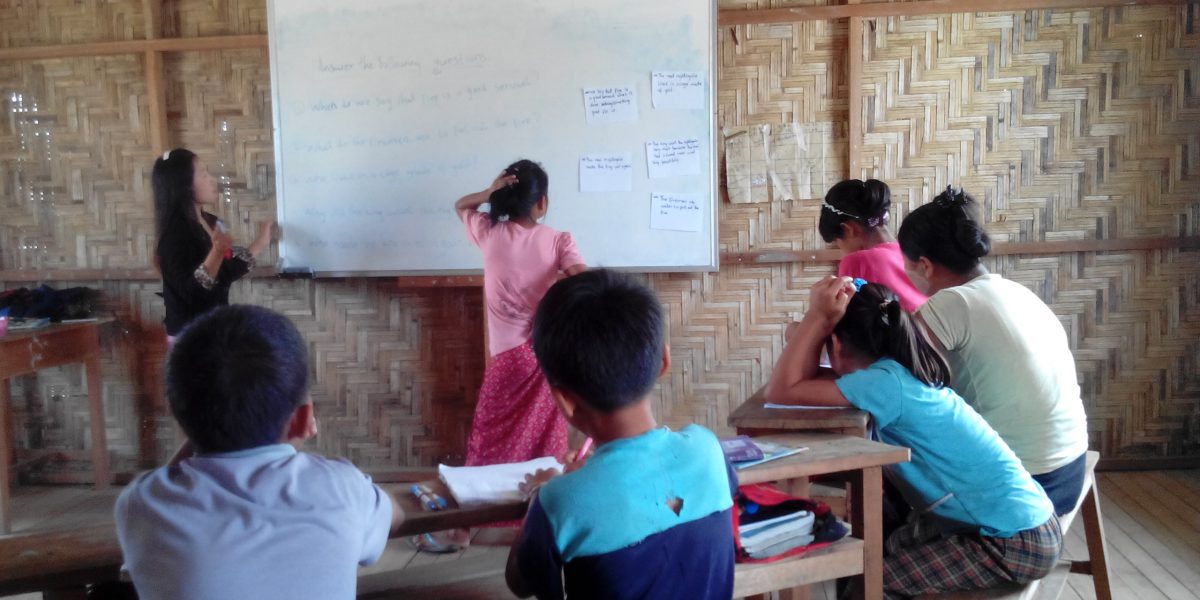Myanmar: Enlightening the candle of future in Kachin
29 July 2016|Fr. Bambang Sipayung SJ

Myitkyina, 29 July 2016 – As he reached the place where he was supposed to teach, John was disappointed. The serene, majestic and beautiful view of kind, clean and great children he expected to see was turned 180 degrees into a different reality. He found a school with 180 children dressed with old, dirty clothes and they didn’t bathe regularly. Apparently, he did not have reliable information about the school, the villages and the people living there. At the same time, he had projected his own optimistic and idealistic reality of the remote and mountainous places of Kachin State.
John is one of the teachers who completed the nine months teachers’ training organized by Jesuit Refugee Service (JRS) in Myitkyina, Episcopal Commission of Education (ECE) and Diocese of Myitkyina Education Commission (DEC) in May 2015. DEC assigned these young boys and girls with an average age of 20 to remote places to kindle and maintain the fire of learning and knowledge building for two years time in Myanmar and for Kachin state.
In 2011, the long-standing cease-fire in Kachin state with the Kachin Independence Organization (KIO) and its military wing the Kachin Independence Army (KIA) ended due to an attack by the Burmese Army against a KIA stronghold near Laisha. It forced people to leave their own villages to find safer places and to the border of Myanmar and China. The conflict disrupted the daily routine and hard lives of the people in these dangerous areas. The existing remote schools that have been struggling to provide a good quality education for children found it even more difficult to maintain the quality, let alone to improve the education of the children.
The idea of a remote place cam often suggest a far off place with a scenic view of green mountainous terrain, flowing clean water running through rivers, people fishing using agricultural as a livelihood to sustain their lives. It also may suggest a lack of infrastructure and facilities which globalized-internet minded people cannot live without.
In the Kachin context, these remote places are ongoing conflict-affected areas. Taking up a challenge of becoming a teacher in those areas from a Myitkyina based young person is a commitment deserving of praise and honorable service. John took that challenge because he wants to be a part of shaping the future of Myanmar and the Kachin people.
In August 2015, JRS, ECE and DEC started another batch of 12 participants for the teachers’ training following John’s batch of 2015. The participants concluded their nine months programs with 9 participants graduating. DEC then assigned them to several remote schools along with those several others from 2015 groups. Sr. Rosemary FI from JRS said that she observed not only growing skills and confidence as young teachers, but also maturity as they have to adjust to the new people coming to the course. They learned practical skills of teaching such as class management, lesson planning, teaching specific subjects, and learning from action – a reflection from Ignatian Paradigm Pedagogy. The approach of the training focused on the children as individuals and subjects of learning which need to grow in their own learning process through the use of creative ways delivering the lessons rather than memorizing. Just before graduation, the participants have to go through a month practicum with children during the summer course.
As John attended the graduating second batch, he also decided that he would like to return to the place where he taught in the previous year. He has a new mission now, to lead and to induct the newly graduated teachers who have never been to that area. He wants to be like a big brother who accompanies them in their early journey as teachers, dealing with the same issues he had to in his first few months there. And yet, John requested if a mechanism could be put in place where more senior staff of DEC and JRS can visit them and help them with technical and on site specific subject review and training. This will give the chance for a more systematic review and accompaniment of these remotely assigned teachers to develop and to grow, not only in their skills, but also in their commitment as individuals. John longs for a new generation with more knowledge, confidence and ability to shape the future of their country.
Written by Fr. Bambang Sipayung SJ in Kachin State, Myanmar


